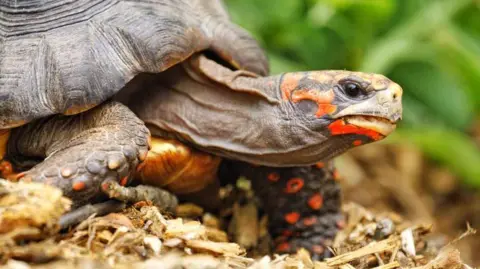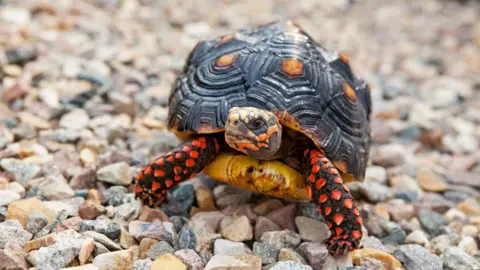Tortoises have human-like feelings, study finds
 Getty Images
Getty ImagesTortoises can feel human emotions, like optimism and positivity, a University of Lincoln study has found.
Tests have shown red-footed tortoises experience long-term moods, similar to those of mammals and birds.
The new findings could help shape how animals are cared for in captivity, according to a university spokesperson.
Prof Oliver Burnman, who studies animal behaviour and welfare, said the results "represent a significant shift in our understanding of what reptiles experience".
A team of researchers studied 15 red-footed tortoises - chelonoidis carbonaria - using a cognitive bias test, commonly used on mammals and birds.
It assessed how they reacted to ambiguous situations, analysing how they felt and found tortoises living in "enriched environments" were more optimistic and positive.
 Getty Images
Getty ImagesThe experts also conducted anxiety-related tests, which involved exposing the tortoises to new objects and unfamiliar environments.
Tortoises that displayed more optimistic decision-making in the cognitive bias test had less anxious behaviour, results found.
A University of Lincoln spokesperson said it was the first clear evidence that animals can experience long-term mood states.
The Animal Welfare (Sentience) Act 2022 states animals have the capacity to feel things, which shapes how the law protects them.
Prof Anna Wilkinson, whose expertise is in animal cognition at the university, said: "Animal welfare concerns are reliant upon evidence that a given species has the capacity to experience affective states.
"With reptiles becoming increasingly common as pets, it is essential for us to study their moods and emotions to try to understand how captivity may impact them."
Listen to highlights from Lincolnshire on BBC Sounds, watch the latest episode of Look North or tell us about a story you think we should be covering here.
Click here to download the BBC News app from the App Store for iPhone and iPad.
Click here to download the BBC News app from Google Play for Android devices.
